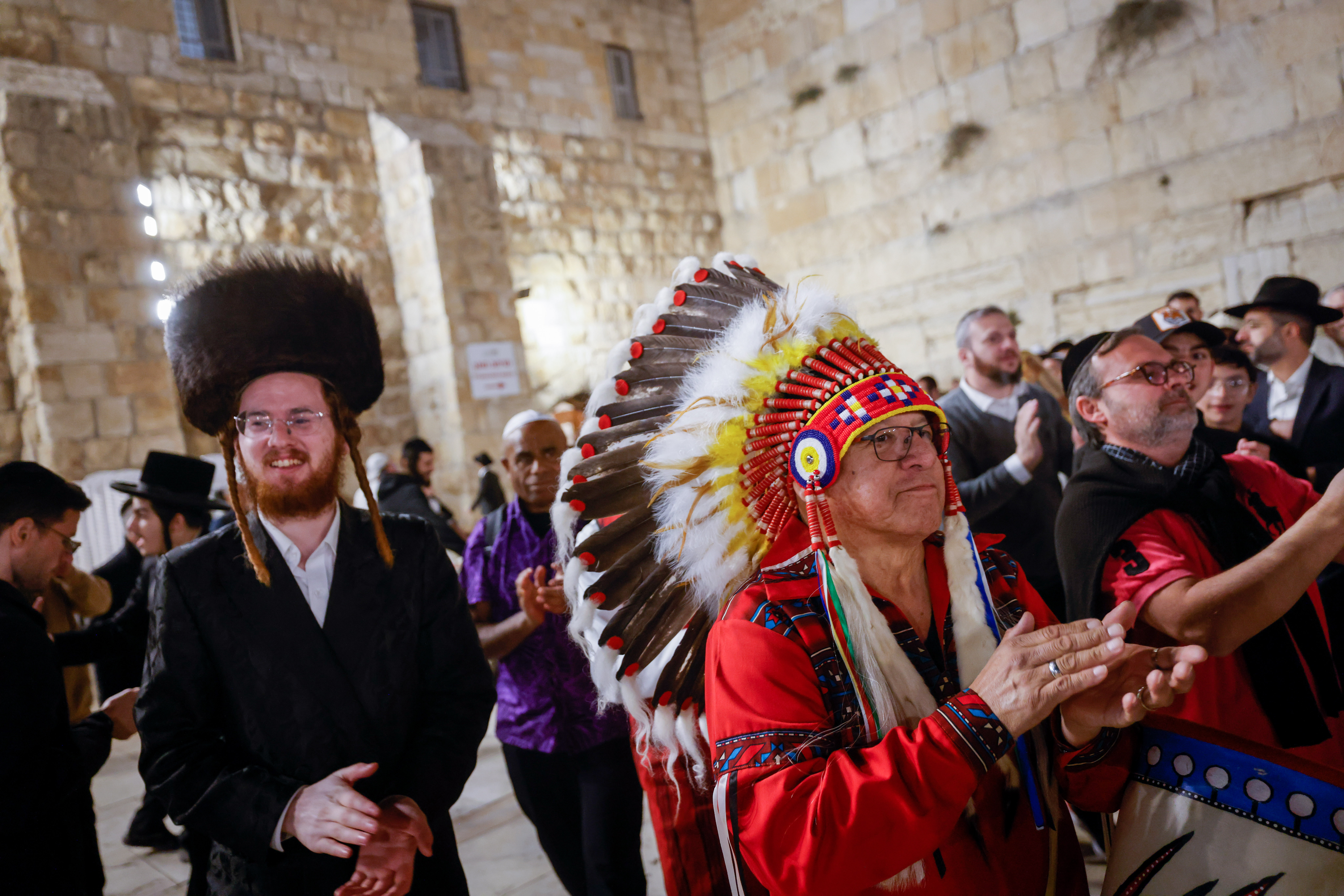In a powerful display of solidarity, approximately 60 Indigenous representatives from across the globe converged on Jerusalem’s Western Wall Plaza on Monday to demonstrate their support for Israel and the Jewish people’s indigenous rights to the land.
The colorful procession, organized by the Indigenous Embassy Jerusalem (IEJ), made its way from Jaffa Gate through the Old City’s ancient streets. Participants wore their traditional attire, including beaded headbands, feathered headdresses, and embroidered shawls, creating a striking contrast against Jerusalem’s historic limestone walls while carrying Israeli flags.
“We really wanted to show our support for the Jews as indigenous people of this land,” Sheree Trotter, co-director of IEJ, told The Times of Israel. Trotter, a Maori scholar and activist who co-founded the Holocaust and Antisemitism Foundation in New Zealand, established the IEJ in February alongside former New Zealand parliamentarian Hon. Alfred Ngaro.
The march culminated at the Western Wall, where participants sang traditional Jewish songs like “Hava Nagila” and “Jerusalem of Gold.” IDF soldiers and local worshippers eagerly approached the delegation for photographs, creating a spontaneous celebration of cultural unity.
At the Western Wall, Ngaro stated that the purpose of the gathering was “to affirm the Jewish people as the first of the ‘First Nations,’ as indigenous people. “God’s brought us all here for this moment,” he said.
Harvey Yesno, Grand Chief of the Ojibwe tribe from Thunder Bay, Ontario, emphasized the parallels between Indigenous peoples’ struggles worldwide and Israel’s situation. “We have the same thing in our lands,” he told The Times of Israel, referring to attempts to delegitimize indigenous rights. “History proves it. Archeology proves it.”
Our Indigenous delegation was privileged to have an audience with President Isaac Herzog. He took the time to speak to each person and showed genuine interest in our stories. We expressed our support for Israel in this difficult time.
— Indigenous Embassy Jerusalem | ICFI (@IndigenousCFI) October 31, 2024
🇮🇱🇮🇱🇮🇱 pic.twitter.com/SukCiQ3LDx
The following day, the IEJ hosted an academic symposium at the Bible Lands Museum in Jerusalem, featuring prominent speakers, including former Soviet refusenik Natan Sharansky. The conference addressed topics ranging from ancient cultural connections to modern political challenges, with presentations by scholars such as antisemitism researcher Izabella Tabarovsky and Hebrew University archeology professor Wayne Horowitz.
Many delegation members’ Christian faith strengthens their connection to Israel. Nicholas Gurub Nawab, a Khoisan chieftain from southern Africa, acknowledged that while sentiment in his community can be hostile to Israel, he is working to change perspectives. “We are busy winning over our tribe so that they can see that we must align with our elder brothers, the Jewish people,” he stated to The Times of Israel.
The Indigenous Embassy in Jerusalem serves as more than just a symbolic presence. Under Trotter’s leadership, it has embarked on an academic mission to counter-narratives that challenge Jewish indigenous rights. The organization is building a research foundation to document and affirm the historical Jewish connection to the land.
Fiji tribal leader Semesi Naciqa, who lives in Nunavut with his Inuit wife, expressed his conviction about Israel’s rights: “The Israeli people have a right to be in this land, and they are Indigenous, just like us,” he told The Times of Israel.
The initiative reflects a growing movement among Indigenous peoples to recognize and support Jewish historical claims to Israel. Through the Indigenous Coalition for Israel (ICFI), based in New Zealand, the movement continues to build international support through education and cultural engagement.
For Trotter, who holds a PhD in the history of Zionism from the University of Auckland, the mission is particularly significant given current political trends. She noted that New Zealand’s political climate has become increasingly challenging for pro-Israel voices, making the work of organizations like IEJ and ICFI even more crucial in presenting historical facts and building international Indigenous solidarity with Israel.
In the early weeks of the war, videos went viral of Maoris performing the traditional Haka dance at pro-Israel demonstrations. Trotter said that while those public displays of support represent the sentiment of many Maoris, they do not reflect the community’s political leadership or of New Zealand politicians in general.
That’s what mates are for!
— Arsen Ostrovsky 🎗️ (@Ostrov_A) November 11, 2023
A Palestinian pro-Hamas rally was meant to be held in Auckland, New Zealand today.
Then a group of #Maoris came and led a Haka in support of Israel.
The Palestinian-Hamas cowards quickly cancelled their rally.
🇳🇿 🇮🇱 pic.twitter.com/y09vPJ7D6Y
Trotter spoke to the symposium about the “hijacking of indigeneity” in favor of the Palestinian narrative in the Maori discourse on the conflict in her native New Zealand.
“New Zealand has become very anti-Israel. It’s part of the progressivist, woke trend. That whole package has taken hold of our country and some of our politicians, and so it’s very difficult. We don’t get a balance, and I’m really sorry. It’s all one-sided,” she said.
“Part of our work is really to educate, to advocate, and to build a community of Indigenous people who understand the history. We’re doing an academic conference and advocacy on social media, to change the culture,” Trotter said at the symposium.
Wayne Horowitz, an archeology professor at Hebrew University, delivered a fascinating overview of his research on ethnoastronomy and the affinities between the cosmological traditions of ancient Israel and the Gwich’in Tribe in Arctic Canada.





